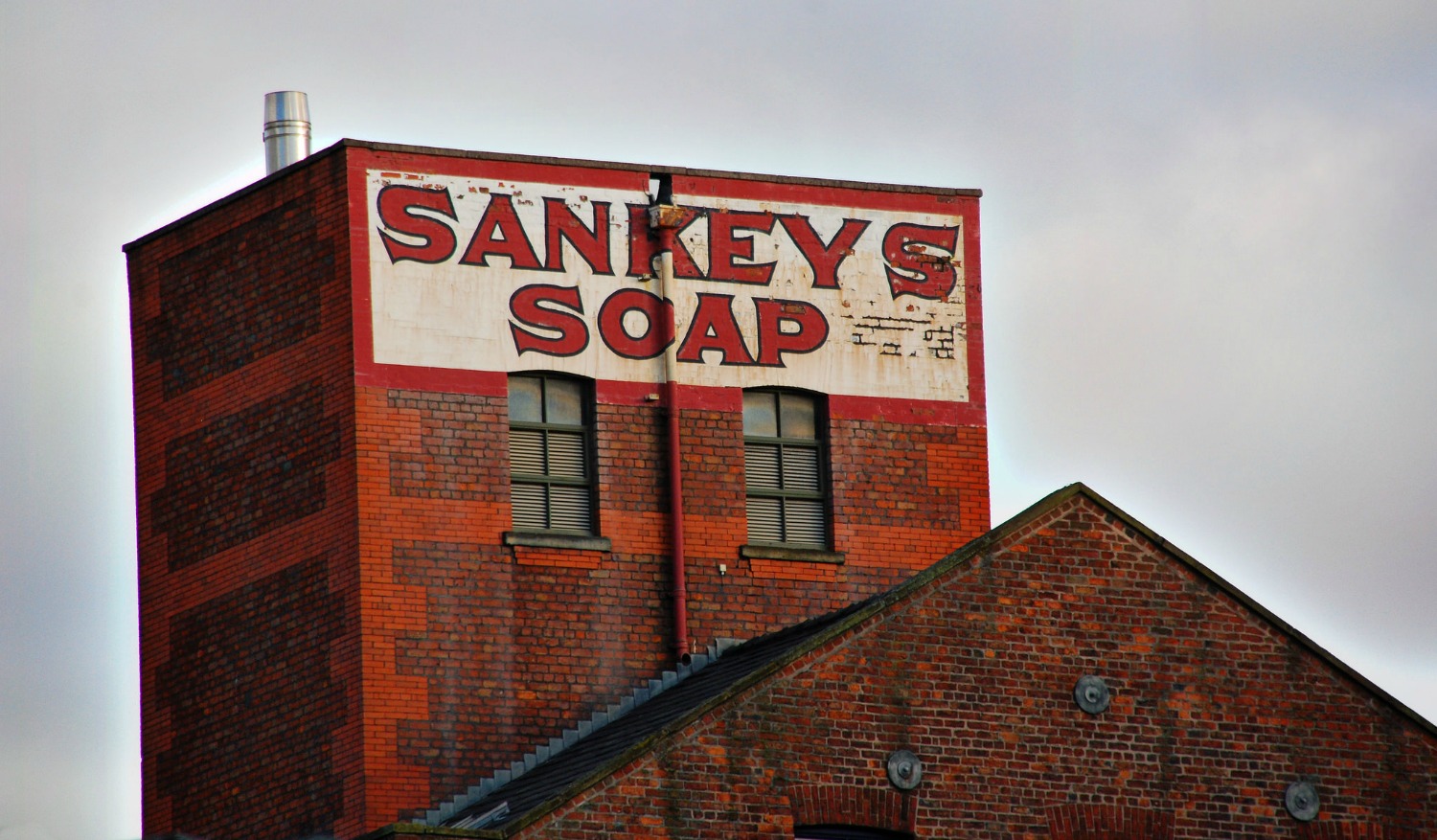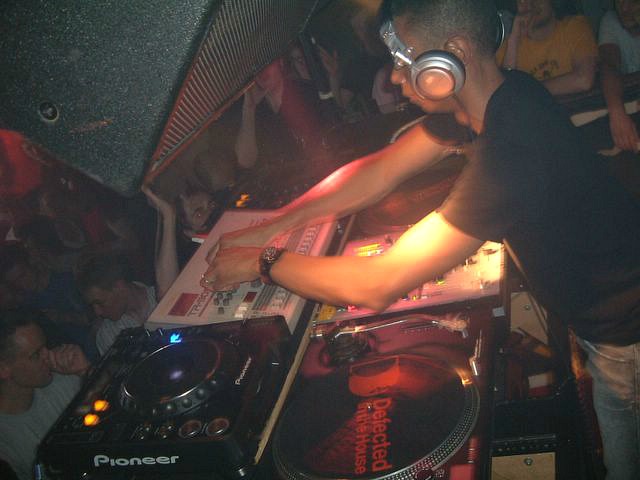Earlier this month, a Manchester clubbing institution shut its doors for the last time. In its ‘90s and ‘00s heyday, Sankeys Soap converted thousands of fresh-faced clubbers to the cause and flew the flag for house and techno hedonism as bland superclubs tried to kill of the spirit of rave, with everyone from Jeff Mills to the Spice Girls welcomed inside. Jack Needham finds out how a disused soap factory became one of Britain’s greatest clubs.
In 1994, after the acid house hangover had subsided, Manchester was in search of a new euphoria. It was to come from a relic of the city’s industrial past, tucked between the disused factories and back alley massage parlors of Ancoats, to the north of the city. Inside a disused soap factory, the next generation of Manchester’s club culture was forged. Over the next decade, Sankeys Soap welcomed the clubbers who’d missed out on the second summer of love (or just fancied repeating it) and became a haven for house and techno hedonism far away from the faceless superclubs. In recent years, the Sankeys brand has gone global, with clubs in Ibiza and Tokyo and a new location in East London. But on January 12, the original Ancoats club shut its doors for the final time after the building was sold to a residential developer, leaving behind a legacy as a cornerstone of Manchester dance music.
“It wasn’t fancy, it wasn’t posh and the sweat would drip from the walls – but it was a true representation of the underground,” says François K, the former Studio 54 and Paradise Garage resident and a Sankeys Soap regular since 2003. On paper, the former soap factory should never have succeeded as a club. When Sankeys Soap opened its doors in 1994, the brainchild of Andy Spiro and the late Rupert Campell, the demise of the Haçienda was looming. Madchester’s ground zero had become more of a hen night destination than the home of hedonism it once was – and if the Cream superclub in nearby Liverpool wasn’t enticing punters out of the city, gang troubles within it were keeping them indoors. Located a 15-minute walk outside of the centre, amid a labyrinth of cobbled streets, derelict buildings and wrong turns, it wasn’t an appealing journey for those who dared to make the trip after dark.

“People would show their passion instead of just being too cool for school”Dave Clarke
But Sankeys Soap did succeed. In those early years you were as likely to see Jeff Mills in the DJ booth as you were to see the Spice Girls dancing to the Chemical Brothers at a Bugged Out! ‘big disco’. It was the setting for a then-unmasked Daft Punk to come face to face with one of their first UK crowds in 1997, while Björk made the club a regular haunt during her Homogenic period alongside Mark Bell of LFO. “People would lose themselves in that room,” remembers François. “As a DJ it was the kind of stuff you lived for.”
“The northern attitude and atmosphere was different,” says Dave Clarke, the Brighton-born DJ who became a regular fixture at the club in the early years. “People would show their passion instead of just being too cool for school. It was a place of pure enthusiasm with people who just wanted to escape what was happening in their daily lives.” If Manchester was then known for pills, thrills and bellyaches as the epicentre of baggy, the likes of Clarke created an atmosphere at Sankeys Soap that, according to former resident Krysko, “had the power to keep people in the city” long after Madchester had fallen out of fashion.
After a rocky start – the club almost went bust within six months of opening – Sankeys Soap came to rival the Britpop ‘ladification’ of Manchester nightlife at the time. The bookers took risks and put techno firmly at the forefront, looking towards Detroit and Chicago to inspire a city that was mired in nostalgia for its punk and acid house heydays.

“Sankeys Soap was the place that took things back underground after the Haçienda and allowed Manchester to resurrect again,” says Stuart McMillan, one half of Glasgow duo Slam, who first played the club in 1994 with Bugged Out!. Taking place every Friday between 1994 and 1998, Bugged Out! was the antithesis of superclubs like Gatecrasher and Ministry of Sound, the polar opposite of whatever forces had brought Judge Jules into the public conscious. In McMillan’s words, Bugged Out! was where “techno brought people together.”
Hosted by Jockey Slut editors John Burgess and Paul Benney, Bugged Out! regularly hosted the likes of Underground Resistance and Derrick May, who endearingly described Ancoats as “more fucked up than Detroit” when he first visited. Tracks like LFO’s ‘Tied Up’ and Plastikman’s ‘Spastik’ were Sankeys Soap staples, and first-timers would leave the club telling friends how they bumped into Bez stumbling out of a cubicle – before realising that would be a weekly occurrence. Students, locals, crusties and Mark E. Smith of The Fall all came through the doors, turnings the club into “a breeding ground of talent,” says Clarke, where the DJs stood shoulder to shoulder with the punters. “You were really in people’s faces when you played. You could see it in their expressions that they just wanted to be a part of your life. You’d see the smiles and hear the big cheers – it was just a very personable place.”
The club closed its doors for the first time in 1998, when local gangs began capitalising on its success – or when they ran out of money, depending on who you believe. But in 2000 the club reopened under the ownership of David Vincent and Sacha Lord-Marchionne, who looked to New York rather than Detroit for inspiration, and brought in Krysko to help cater to a new audience who were in search of something more than a rebranded Bugged Out! night. After playing Sankeys Soap every Saturday from 2000 to 2006, at a night called The Redlight, Krysko is now resident at the city’s annual Warehouse Project series and the owner of new label I Walked By Night.

“The atmosphere – to a teenager from the suburbs at least – was intimidating, but it was an institution”XXXY
“We’d all just missed out on the Haçienda and Bugged Out!, so it was like you were starting again really,” he remembers. “Over those years everyone came to the city from different places and it was very much like a changing of the guard. We had all moved [to Sankeys] from the Haçienda, which made you feel like you’d become a part of something new, so it felt like it was your place, your club.”
For many fresh-faced students and out-of-towners, Sankeys Soap was their first taste of proper nightlife beyond village pubs and 50p-a-shot commuter town clubs. “It was a gateway into all sorts of things,” says Rupert Taylor, otherwise known as producer XXXY. Moving to Manchester in the early 2000s, Taylor says he had a “love-hate relationship” with Sankeys, but still credits the club for his transition from indie kid to Panorama Bar regular. Shunning the “revival nights and Madchester bollocks,” Sankeys Soap for him became “a place which urged me to create electronic music.”
“It had a great sound system, the best DJs and if you were into dance music in Manchester, you went there,” says Taylor. “It was a dodgy area and the atmosphere – to a teenager from the suburbs at least – was a little bit intimidating, but it was an institution.”
It’s true that Sankeys Soap could be an intimidating place at times – though much of that fear was stoked by rumour. Clubbers whispered about bouncers confiscating class As only to sell them back to the crowd inside, or how David Vincent was contractually banned from his own club whenever Dave Clarke played there. In fact, Clarke confirmed that story (“He was just really fucking annoying,” says the DJ) but most of the rumours remain exactly that. “If you were there you heard the stories, but there was no evidence for these things,” says Krysko. “That’s why I look back on that time with fondness, because some stories are legend. When nothing is documented it’s a nicer way of looking back on that time.”

“I think maybe they lost focus of what made it special in the first place”François
In 2006, Vincent and Lord-Marchionne parted ways, the latter going on to create The Warehouse Project alongside Sankeys Soap promoter Sam Kendall. Under the solo ownership of Vincent the club underwent a makeover, replacing its dingy decor with VIP booths and evolving into the Ibiza-fied Sankeys brand we see today. It remained successful, but eventually it grew into the kind of glossy superclub it once proudly rivalled. “It became more about politics and less about the music,” reckons Clarke, “and when that happens, something is always bound to suffer.” François agrees: “I think maybe they’ve lost focus of what made the place special in the first place. The walls were dark and the lighting was primitive, and this is what you want from a party. After that, for me I felt like it may never have managed to recapture what the old place had.”
Given the club’s record of closing, reopening and closing again, perhaps we can expect Sankeys to return to Manchester within the year – they haven’t exactly ruled it out – and with another new club set to open in Birmingham, the Sankeys brand is far from finished.
But in Manchester, the club now joins the Haçienda and Factory Records in the nostalgic tapestry of the city’s hedonistic past – an important part of our history, but one that may better left behind. As Manchester’s musical output continues to diversify, it’s disappointing to think that one reason behind Sankeys’ closure may have been its failure to do the same. But rather than detracting from its success, that thought can act as a reminder of what Sankeys has left in its wake. “We’re lucky that we went through those phases,” says Clarke. “But there will always be another generation who will continue to create their own happy stories in the city.”
Read next: Sterns – the rise and fall of an unlikely superclub





























